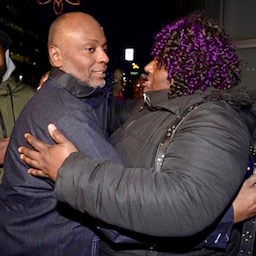 Larry McKee embraces his sister, Shakimla McKee (Photo: Jefferson Siegel/New York Daily News)
Rossy Chatelain, who was walking with Vance, told police that 25-year-old Larry McKee shot Vance. The shooting happened after Vance attacked McKee because Vance believed McKee was ogling his girlfriend. McKee ended the fight because he was losing.
Chatelain said that later he and Vance were walking to Vance’s home when he saw McKee, who was black, and a Hispanic man walking behind them. One of them called out, “Yo, yo, turn around,” Chatelain said.
Chatelain told police that the Hispanic man threw a bottle and Vance fled. McKee then pulled out a gun and shot twice. The Hispanic man did not have a gun, Chatelain said. Vance was shot twice and died an hour later.
McKee was arrested and charged with second-degree murder.
In May 1997, three weeks before McKee was scheduled to go to trial in Bronx County Supreme Court, the prosecution revealed a statement that a witness gave on the night of the shooting. Augustus Rivera said that he saw two Hispanic males and one black male chasing Vance and that one of Hispanic men shot Vance.
When McKee’s defense attorney interviewed Rivera, he learned that the prosecution had interviewed Rivera two weeks earlier—before disclosing Rivera’s existence to the defense—and Rivera had since changed his statement. He insisted he saw nothing on the night of the crime and he claimed that was what he told police that night.
The prosecution didn’t reveal the name of the detective who took the original statement from Rivera until after McKee’s trial was already underway. When the defense objected to the late disclosure, the trial judge granted a recess for several days to allow for further investigation. That effort was stymied when the detective refused to speak to the defense.
The prosecution’s case rested primarily on the testimony of Chatelain, who identified McKee as the gunman, although his initial description of the gunman was a man 6 feet 3 inches tall and weighing 170 pounds. McKee was 5 feet 9 inches tall and weighed 210 pounds.
When the defense sought to call Rivera as a witness, the judge ruled that the defense could not ask him about the police report. The report quoted him as saying that a Hispanic man shot Vance, but Rivera had by then disavowed that report. When the defense sought to call the detective to testify about the report, the judge said that the defense could not ask him about the report’s contents.
As a result, the defense did not call Rivera or the detective. Instead, the defense called Koshoto Stanback, who testified that he heard three or four shots and saw two flashes of light. Stanback said he saw a man an inch or two taller than 5 feet with a yellow complexion wearing a black leather jacket. The defense also sought to introduce a tape of a 911 caller who reported that the gunman was a Hispanic male with a pale yellow complexion and wearing a dark jacket. The judge denied that as well.
On June 5, 1997, the jury convicted McKee of second-degree murder. He was sentenced to 24 years to life in prison.
After the conviction and prior to sentencing, the trial judge ordered a hearing to determine whether the prosecution’s late disclosure of the information about Rivera’s statement resulted in an unfair trial. The judge ruled that the prosecution should have disclosed the report of Rivera’s statement and the name of the detective earlier, but that the delay did not cause McKee’s trial to be unfair.
The judge noted that at the time of disclosure, Rivera was still available and there was no evidence that Rivera would have affirmed his initial statement if he had been interviewed earlier. Moreover, because the defense had been granted a mid-trial continuance to further investigate, the delay did not warrant a new trial.
The Appellate Division of the New York Supreme Court upheld McKee’s conviction. In 2001, he filed a federal petition for a writ of habeas corpus challenging the denial of a new trial. A federal judge dismissed the petition and in 2002, the U.S. Court of Appeals for the Second Circuit upheld the dismissal.
In 2016, Darcel Clark was elected Bronx District Attorney and subsequently established a conviction integrity unit to examine claims of innocence from defendants who asserted they were wrongly convicted.
McKee’s attorney Michael Talassazan requested that the CIU re-examine McKee’s case. In his own investigation, Talassazan had learned that Rivera was dead. He also found a new witness who said that he was present and saw a Hispanic man shoot Vance.
On January 29, 2018, assistant district attorney Risa Gerson asked New York Supreme Court Judge Robert Torres to vacate McKee’s conviction. Gerson, the head of the conviction integrity unit, had discovered that another witness had testified before the grand jury that indicted McKee that Vance, after he was shot, said the gunman was “a Spanish guy.” That statement was never disclosed to McKee’s trial defense lawyer.
Gerson said the failure to disclose the grand jury testimony was “particularly disturbing.” Moreover, “given the nature of the grand jury testimony that was never turned over, the newly discovered witness, considered in combination with the other evidence the jury did not get to hear,” the conviction should be vacated “in the interest of justice.”
Judge Torres then granted the motions to vacate the conviction and dismiss the charge, and McKee was released.
McKee subsequently filed a compensation claim in the New York Court of Claims. In December 2018, he filed a federal civil rights lawsuit against the Bronx County District Attorney's Office and two New York City police detectives. He settled the lawsuit on April 7, 2021, receiving $4.89 million as compensation for his wrongful conviction. Separately, McKee received $4.5 million in compensation from the New York Court of Claims on March 21, 2022.
– Maurice Possley
|